‘Welcome Home Westchester’ campaign launched to address housing crisis – Westfair Online
A new effort by a coalition of organizations and businesses to address what is described as “the housing crisis in Westchester” was launched June 24 with a news conference in front of the Regent Street Senior Apartments in Port Chester.
While there have been successes in providing workforce, low-income and senior housing projects, only a small dent has been made in creating the 11,703 housing units that the 2019 Westchester County Housing Needs Assessment prepared by the county said are needed.
The Regent Street project was selected as an example of what can be accomplished with enough citizen, business and political support. It’s a 34-unit building with six apartments specifically designed for people with mobility impairments.
The Building and Realty Institute (BRI) is a prime organizer of the campaign. The Westchester County Association, Nonprofit Westchester, Community Housing Innovations, Westhab and Lifting Up Westchester are among other organizations involved in the Welcome Home Westchester effort along with businesses such as Murphy Brothers Contracting and Wilder Balter Partners.
Tim Foley, CEO and Executive Vice President of the BRI, said that housing is the connective tissue that binds all of its members together.
“Over the years we’ve seen time and time again the way things have always been done here in Westchester impacts what can and cannot get built here,” Foley said.
He expressed the opinion that an inefficient meeting of a land use board or detail in the zoning code that was made so long ago that no one can remember what it’s trying to achieve or the loudest voices though not necessarily the most representative voices can contribute toward inaction.
Foley said that not addressing all of the different needs for affordable housing, senior housing, housing for millennials who want to move back into the region, workforce housing, housing for those with disabilities and market-rate housing makes the housing debate more contentious.
“Having our towns and villages default to single-family housing for most of their land use, the least energy efficient, the least climate friendly source of housing, makes it that much harder to deal with the buildings that make up almost 40% of our carbon emissions,” Foley said.
“Similarly, the local processes, land use boards and decision-making in some communities, reflect assumptions that haven’t been reexamined for decades. Sometimes they’re simply out-of-date. Other times, they’re continuing to do exactly what they were designed to do; limit the amount of available housing in Westchester and make it harder for future neighbors, particularly people of color, to move in.”

The campaign plans to raise awareness of the housing situation in the county while taking action such as working to reform the way volunteer land use boards work and putting a spotlight on zoning practices that contribute to the housing shortages.
Jan Fisher, executive director of Nonprofit Westchester, said the affordable housing crisis deeply impacts the nonprofit workforce.
“While 40% of Westchester residents are housing-burdened, 60% of the nonprofit workforce is housing-burdened and that percentage rises to 70% for the direct-care staff. The nonprofit workforce cannot live where they work,” Fisher said. “We can do better.”
Michael Romita, president and CEO of the Westchester County Association, said that businesses are impacted not only when the housing stock is inadequate but especially when housing costs are too high, “starving local businesses of workers or forcing those businesses to pay higher salaries to subsidize commuting costs.”
Romita said businesses suffer if workers are forced to look elsewhere for housing and employment.
“We can’t maintain a healthy economy if our teachers, our first responders, nurses, accountants, engineers, and other working-class folks can’t afford to live in your community. You can’t cultivate a real community if young professionals, the elderly and those with special needs go under-served. For a vibrant business environment, we need to welcome our middle-class home to Westchester.”
Ron Abad of Community Housing Innovations said his organization was instrumental in bringing a 10% affordable apartment requirement to a corporate park redevelopment project in Harrison.
“We have no choice but to do better for our neighbors, particularly on the affordable housing front,” Abad said, calling for the removal of land use zoning barriers along with providing increased housing access and support for upward economic mobility.





